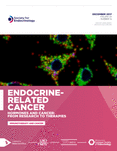Patient derived tumour xenografts for breast cancer drug discovery
- J Cassidy, Cancer Research UK Cambridge Institute, University of Cambridge, Cambridge, United Kingdom of Great Britain and Northern Ireland
- A Batra, Cancer Research UK Cambridge Institute, University of Cambridge, Cambridge, United Kingdom of Great Britain and Northern Ireland
- W Greenwood, Cancer Research UK Cambridge Institute, University of Cambridge, Cambridge, United Kingdom of Great Britain and Northern Ireland
- A Bruna, Cancer Research UK, Cambridge Institute , University of Cambridge, Cambridge, United Kingdom of Great Britain and Northern Ireland
- Correspondence: Alejandra Bruna, Email: alejandra.bruna{at}cruk.cam.ac.uk
Abstract
Despite remarkable advances in our understanding of the drivers of human malignancies, new targeted therapies often fail to show sufficient efficacy in clinical trials. Indeed, the cost of bringing a new agent to market has risen substantially in the last several decades, in part fuelled by extensive reliance on preclinical models that fail to accurately reflect tumour heterogeneity. In order to halt unsustainable rates of attrition in the drug discovery process we must develop a new generation of preclinical models capable of reflecting the complex heterogeneity found in human cancers. Patient derived tumour xenograft (PDTX) models prevail as arguably the most powerful in this regard; because they capture cancer's heterogeneous nature. Herein, we review current breast cancer models and their use in the drug discovery process, before discussing best practices for developing a highly annotated cohort of PDTX models. We describe the importance of combination drug-drug screens and extensive genomic characterisation of models, required to identify complex biomarkers of drug resistance and response. By taking these considerations as our guiding principles, we reflect on our own experiences in developing an integrated pharmacogenomic platform for breast cancer drug and biomarker discovery. We strongly support the use of PDTXs in oncological drug development and emphasize the need for improvements in the current generation of PDTX models for basic and translational research.
- Received 20 June 2016
- Revision received 28 September 2016
- Accepted 4 October 2016
- Accepted Preprint first posted online on 4 October 2016












